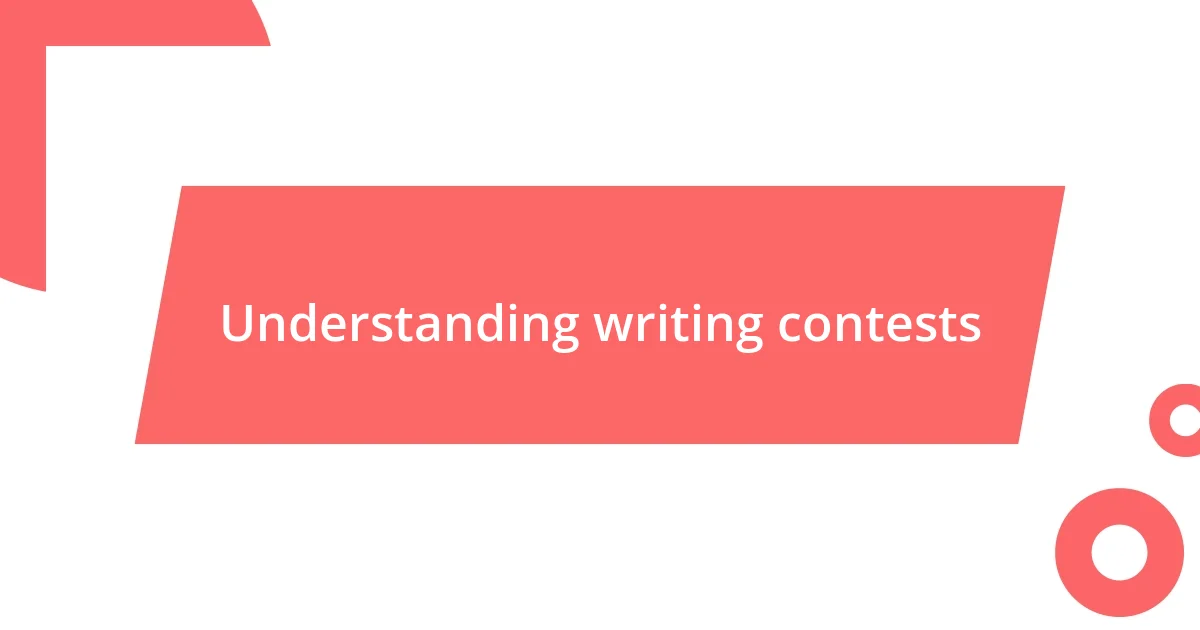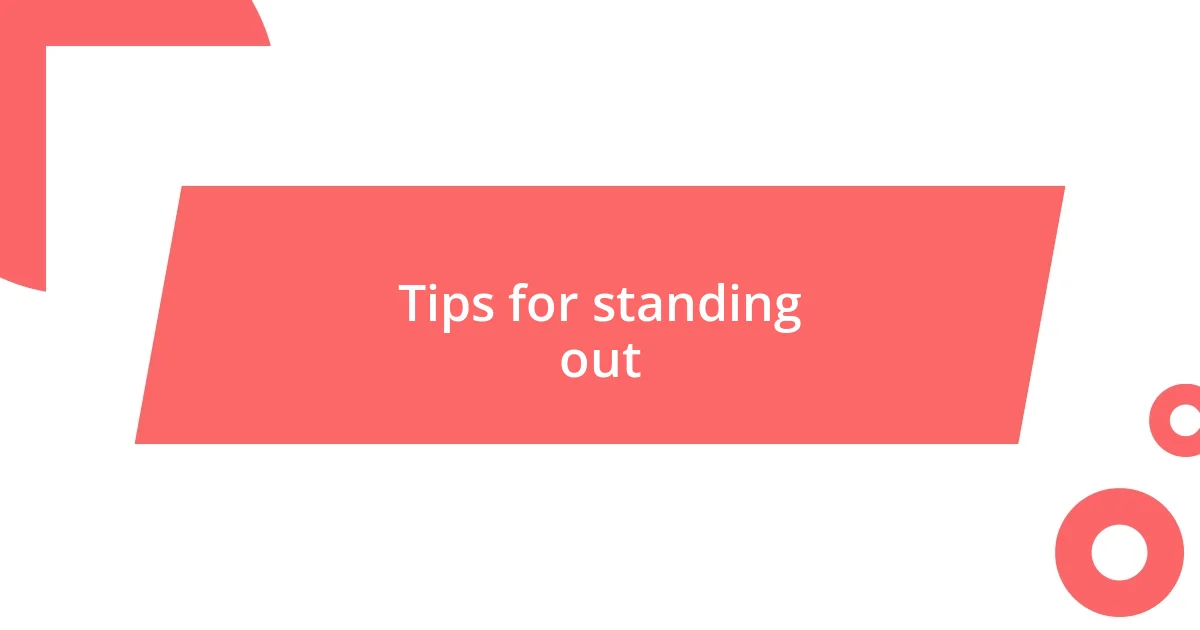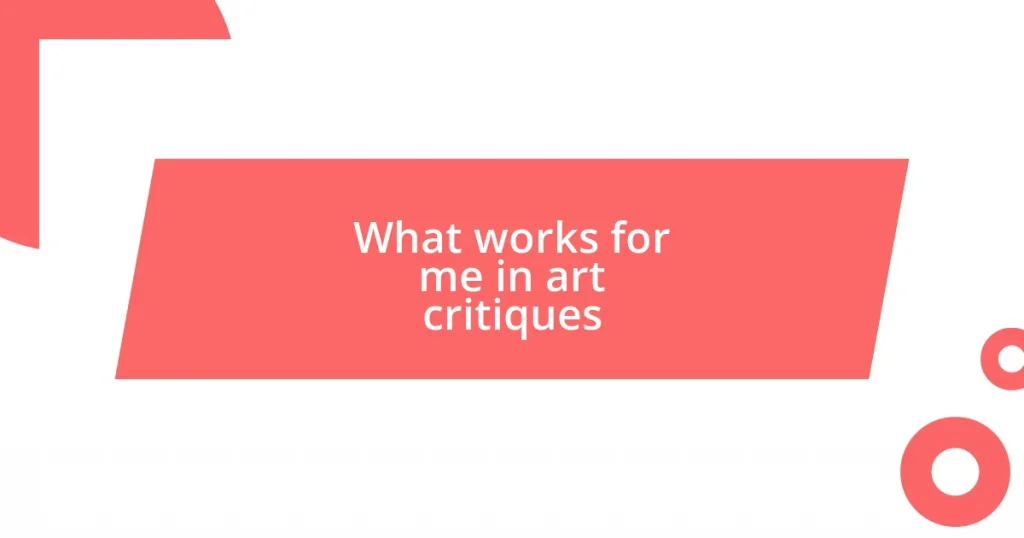Key takeaways:
- Understanding the judging criteria of writing contests is crucial to stay true to your voice, as feedback can vary significantly between judges.
- Preparation is key; following guidelines meticulously, gathering feedback, and submitting early enhance the quality and confidence of your submission.
- Celebrating achievements, regardless of their size, reinforces motivation and fosters a sense of community among writers.

Understanding writing contests
Writing contests can be an exhilarating way to showcase one’s creativity and hone your craft. I remember the rush I felt entering my first contest; the anticipation of seeing my work recognized was electrifying. Have you ever thought about how a little competition can fuel your passion and push your limits?
These contests often come with unique themes and challenges, compelling writers to think outside the box. I once faced a prompt that had me scratching my head, yet it forced me to explore ideas I hadn’t considered before. It’s fascinating how constraints can actually unlock our creativity, isn’t it?
Moreover, understanding the judging criteria is crucial. I’ve been on both sides—participating and judging—and it gave me insight into how subjective writing can be. I learned that what resonates with one judge might not strike the same chord with another, which taught me the importance of staying true to my voice, regardless of the outcome. What do you think drives a judge’s decision?

Choosing the right contest
When it comes to choosing the right contest, I always start by considering my own strengths and interests. I recall a contest that focused specifically on short fiction, which aligned perfectly with my love for storytelling. The more the contest caters to my style, the more motivated I feel to create something unique. Is there a genre you resonate with?
Next, I think about the prizes and recognition offered. Early on, I entered a contest that promised publication as a prize. The thought of seeing my name in print was exhilarating! I believe that contests with tangible rewards can be more motivating, but it’s essential to ensure those benefits align with your goals as a writer. What would you value more—recognition or financial reward?
Lastly, it’s vital to research the credibility of the contest. I once stumbled upon a competition that seemed too good to be true; it offered large cash prizes but lacked transparency. I learned the hard way that some contests can be exploitative. Taking the time to read reviews and verify the legitimacy of a contest can save you from potential disappointment later. Have you ever been wary of a competition?
| Factors to Consider | Details |
|---|---|
| Alignment with Personal Style | Select contests that resonate with your writing style and genre. |
| Prizes and Recognition | Consider what you value—publication, cash prizes, or something else. |
| Credibility of the Contest | Research to ensure the contest is legitimate and trustworthy. |

Preparing your submission effectively
Preparing your submission effectively is not just about meeting requirements; it’s about presenting your work in the best light. I’ll never forget the time I spent hours fine-tuning my submission for a contest that meant a lot to me. I carefully read the guidelines, ensured my formatting was spot-on, and sought feedback from trusted friends. This preparation not only boosted my confidence but also gave my piece that extra polish that judges appreciate.
Here’s a quick checklist to help you prepare your submission effectively:
- Read the Guidelines Thoroughly: Ensure you follow all formatting, word count, and genre specifications.
- Edit and Revise: Don’t hesitate to revise your work multiple times. A fresh pair of eyes can catch mistakes that you might miss.
- Gather Feedback: Share your draft with fellow writers or friends for constructive feedback. Their insights can help enhance your story.
- Check Submission Details: Confirm that you have all submitted documents ready (like cover letters, bios, etc.) and check the submission method.
- Submit Early: I always aim to submit a few days before the deadline. This way, I can avoid last-minute issues and have peace of mind.
By following these steps, I find that my submissions are not only more organized but also become a true reflection of my voice as a writer. What steps do you take to prepare your submissions?

Crafting a compelling story
Crafting a compelling story is all about connecting with your audience emotionally. I remember my first foray into a writing contest where I wrote a piece inspired by a personal event. Sharing my vulnerability helped forge a stronger connection with readers, and I realized how powerful it can be to weave authentic experiences into fiction. Have you tapped into your own experiences for inspiration?
A significant element of storytelling is character development. I once created a character that reflected parts of my own journey, and it felt as though I was infusing my story with real essence. The depth of that character resonated with judges more than I anticipated, proving that when we add layers to our characters, we invite others to see bits of themselves in our work. How do your characters reflect your own life?
As I navigate the challenge of crafting stories, I’ve found that pacing is crucial. There was a contest where I rushed through the climax, thinking it would hold more intrigue, but I learned that slowing down at pivotal moments can enhance suspense and emotional impact. It’s a delicate balance; taking time to build tension rewards both the writer and the reader. Have you ever felt that a story needed to breathe to truly captivate?

Tips for standing out
One effective way to stand out in writing contests is to find your unique voice. I vividly recall a contest where I decided to experiment with a narrative style that was entirely my own. Instead of adhering to conventional norms, I embraced a more conversational tone, almost as if I were sharing a story with a friend. This approach not only conveyed authenticity but also made my piece memorable among many. Have you ever considered how your style can set you apart?
Another tip that helped me in getting noticed was to incorporate strong imagery and sensory details. I learned this the hard way after receiving feedback on a submission that fell flat due to vague descriptions. In a later contest, I painted vivid scenes that engaged all five senses, allowing readers to immerse themselves in the world I’d created. As I included the smell of rain and the sound of whispering leaves, I could actually feel the judges responding to my words. How do you use sensory details to enhance your narratives?
Don’t underestimate the power of a strong opening line! A captivating hook can make all the difference in enticing judges to keep reading your work. I remember starting one of my entries with a bold statement that immediately grabbed attention. It sparked curiosity right from the get-go, making the judges want to dive deeper into my story. What are some ways you can craft a compelling opening that reflects your story’s essence?

Learning from feedback
Feedback is an invaluable tool I’ve come to cherish after participating in numerous writing contests. I vividly remember a piece I submitted that received mixed reviews; the judges appreciated my voice but pointed out areas lacking clarity. Instead of feeling discouraged, I took their comments to heart, allowing their insights to guide my revisions. Have you ever paused to reflect on how constructive criticism could elevate your writing?
One particular piece of feedback that resonated deeply with me came from a contest where my character’s motivations felt unclear. A judge noted this and encouraged me to delve deeper into my character’s backstory. Following this advice, I rewrote sections of my story, breathing new life into my character’s journey. It was truly satisfying to see how this not only strengthened the narrative but also brought me closer to my readers. How often do you let your characters drive the story forward?
I discovered that learning from feedback isn’t just about improving specific pieces; it’s about personal growth. I’ve realized that when I embrace constructive criticism, it encourages me to be more vulnerable and honest in my writing. Initially, that felt daunting, but now it’s a source of empowerment. Reflecting on feedback has transformed my process, guiding me to write with authenticity and courage. How has your perspective on feedback shaped your creative journey?

Celebrating your achievements
Celebrating achievements can often be overlooked, yet I find it to be fundamental in nurturing my writing journey. After I won a small local contest, I remember feeling an overwhelming rush of validation. It was the first time I’d shared my work publicly, and that recognition ignited a new spark within me. Have you ever felt that exhilarating moment when your efforts are acknowledged?
In another instance, after a runner-up finish in a national contest, I treated myself to a small celebration with friends. We shared stories, laughter, and I proudly read excerpts from my piece, basking in the shared joy of my accomplishment. Looking back, that gathering not only reinforced my connection with my writing community but also reminded me that celebrating successes—big or small—fosters motivation. How do you choose to celebrate your victories in writing?
I’ve realized that each milestone, whether a win or simply finishing a piece, deserves recognition. When I completed my first draft for a challenging contest, I took a moment to savor that achievement rather than rushing into revisions. It was an emotional acknowledgment; I had poured my heart into that draft. Those moments of reflection energize me, proving that celebrating achievements is not just about the accolade itself—it’s about honoring the journey and the growth that comes with it. How do you recognize your progress along the way?















